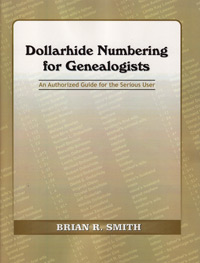Almost anyone who has spent any serious time in family history knows the name William Dollarhide. He has authored 13 books and countless articles.  He has also spoken at over 700 national and local events and societies in almost every state in the country. Through his experience in working with his own family history records, Dollarhide devised an enhanced numbering system for genealogical databases. Though he never gave this system an official name, over years other genealogists came to call it the Dollarhide Numbering System.
He has also spoken at over 700 national and local events and societies in almost every state in the country. Through his experience in working with his own family history records, Dollarhide devised an enhanced numbering system for genealogical databases. Though he never gave this system an official name, over years other genealogists came to call it the Dollarhide Numbering System.
In a newly published book, author Brian R. Smith formalizes the Dollarhide numbering system, organizing its principles and describing it in plain English. Dollarhide Numbering for Genealogists – An Authorized Guide for the Serious User provides a step-by-step guide to using the Dollarhide numbering system.
Smith first explains the two most common systems used in genealogy, Ahnentafel numbering for ancestors and the Henry system for descendants. The Dollarhide system combines the two, creating a single system capable of indexing almost any relationship one could find within an extended family. (This system allows for not only indexing direct relations but also relatives such as multiple spouses (including former and later marriages), half siblings, adopted and step children, other non-blood relations, and much more.)
This authorized guide can help improve the indexing system of any genealogist. Unfortunately, most software lacks the ability to index with the depth of the Dollarhide system. However, to use the Dollarhide system within family history software, the user can easily manually enter each person’s number. This may be too much work for some, but for those looking to create a comprehensive catalog of their database the Dollarhide Numbering system is for you. Too get a good handle on working with this system, look no further than Brian R. Smith’s new handbook, Dollarhide Numbering for Genealogists.